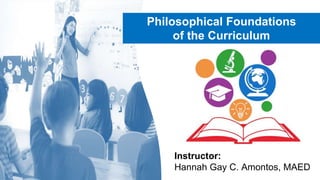
Philosophical Foundations of Curriculum in 38 Characters
- 1. Philosophical Foundations of the Curriculum Instructor: Hannah Gay C. Amontos, MAED
- 2. Objectives At the end of the session, the students are expected to 1. Recognize the philosophies that serve as the bases of the K-12 Curriculum; 2. Identify the aim, role and focus of each philosophy; and 3. State how the concepts of each is applied to the current K-12 curriculum.
- 3. Think About It! What would you include if you are to design your own curriculum?
- 4. Philosophical Foundations of the Curriculum Curriculum Essentialism Perennialism Progressivism Reconstruc- tionism Constructivism Pragmatism
- 5. Aims to instill the most essential or basic academic knowledge, skills and character development. Focuses on the essential disciplines like math, natural sciences, history and literature. Teacher and administrators decide on the content regardless of student’s interest. Teacher-centered. Teacher is the sole authority in the classroom and serves as the intellectual and moral role model. In Essentialism, students are required to master a set of basic and pre-requisite knowledge before they can move to the next level. Test scores are the means to evaluate progress.
- 6. Aims to educate the rational person and cultivate their intellect. As a subject-centered philosophy, it focuses on a timeless and enduring curriculum (Universal truth in the great books like the Bible, Koran, the Western Canon, the Great Conversation and other Classics)- the everlasting principles applicable to many people. Thus, the fundamental subject areas are given importance. Teachers assist students to think critically. In perennialism, the 4 macro skills are emphasized in the basic education to prepare learners to study literature, history and philosophy, and develop students to be well- disciplined and critical thinkers .
- 9. Aims to promote democratic social living by putting the learner’s needs, experiences and interest at the center of their curricula. It aims to develop learners who are problem solvers through approaches that involve collaborative and experiment based approaches. It focuses on interdisciplinary subjects, learner centered-teaching and is outcomes based. Teachers serve as leaders for growth and development of life long learners. Progressivism in the curriculum allows for equal opportunities for all, contextualized learning and humanistic education.
- 10. Aims to create social reforms through education and to develop awareness to resist oppression and create a better society with human compassion. It focuses on student experience and taking social action on real problems, such as violence, hunger, international terrorism, inflation, and inequality. Teachers serve as agents of change and reform. For the reconstructionist, the school and the curriculum is an agent of positive change, hence, community based learning and bringing the world into the classroom (authentic experience and authentic assessment) should be incorporated in the curriculum.
- 11. Aims to promote active learning by construction of knowledge through meaningful real world experiences. The focus of constructivism is on learning as an active process and knowledge is built upon experience. Teachers are facilitators as student build new knowledge from prior knowledge and experiences. The spiral progression of the K-12 curriculum is based on the constructivist philosophy that students build upon existing knowledge.
- 12. Principles of Constructivism 1. Knowledge is constructed. 2. People learn to learn, as they learn. 3. Learning is an active process. 4. Learning is a social activity 5. Learning is contextual
- 13. Principles of Constructivism 6. Knowledge is personal. 7. Learning exists in the mind. 8. Motivation is key to learning.
- 14. Aims to help learners fulfill their biological and social needs and enable students to create their own values to adapt to the various changes in society. The focus of pragmatism is to include activities and experiences in the curriculum that will help them be ready for life (through learning by doing). Teachers suggests real world problems/ pedagogical situations based on real life to learners and to stimulate them to find solutions that will work. Pragmatism and Progressivism are both brain children of John Dewey. In the K-12 curriculum, inquiry based and problem based approaches are encouraged to examine and find solutions to real world problems. Performance assessments which encourages students to apply knowledge to real world tasks is required.
- 15. The aims of education as formulated by the Pragmatists are the following: 1. To create new values; 2. To enable pupils to gather experience through activity; 3. To help the pupil to adjust with him and the society; 4. To help the pupil to reconstruct his experience; 5. To make all round development of the pupil.
- 16. In the field of curriculum development, the following principles have been prescribed by the pragmatists. 1. Principle of Utility 2. Principle of Interest 3. Principle of Experience 4. Principle of Integration